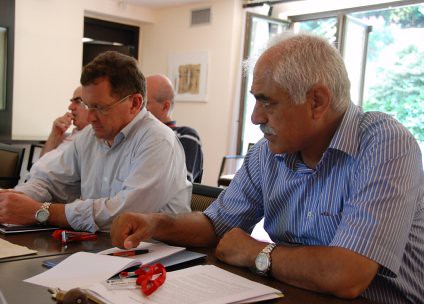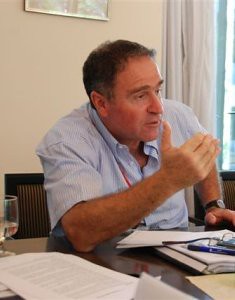“The business community should lead – the Government should support” - Auslandsbüro Israel
Veranstaltungsberichte
Aim of this meeting was in particular to formulate concrete suggestions as how to turn the “economic peace” which is propagated by the current Israeli government into an effective, problem-solving process. The participants agreed that this “economic peace” policy needs to run parallel to a political peace process. It was also emphasized the Palestinian side should not torpedo the Israeli efforts to strengthen the Palestinian economy out of concern for “normalization”. According to feedback from the Palestinian participants considerable progress has been made in the past year regarding movement and access in the Westbank. The initiative of Silvan Shalom, minister for regional cooperation, to expand the working hours at Allenby crossing between Westbank and Jordan is also an important step in the right direction which needs to be followed by further concrete improvements regarding the commercial crossings in order to facilitate successful trade and a recovery of the Palestinian economy. Improvements are in the interest of both business communities.

The group discussed the question whether a shift can be seen in the Israeli employment policy of Palestinian workers. Since Israel has been facing growing problems with its foreign non-Palestinian workers who stay in the country there seems to be a potential for an increase of the number of Palestinians working in Israel. An overall decision how the future trade relations will look like most probably cannot be expected in the near future. The only existing agreement is the Paris Protocol which specifies a custom envelope; until there is a different decision – which should be coming from the Palestinian side and could be a free trade agreement for example – these are the working parameters. In contrast to many other steps that should be taken, having more Palestinians working is Israel would jump-start the Palestinian economy immediately. The largest need in Israel is in the construction sector which could instantly absorb an additional 9,000 workers. Also the tourism sector should be looked into.

One session was dedicated to industrial zones starting out with a representation by a representative of the Israeli ministry for industry and trade. The initial idea of joint Isaeli-Palestinian industrial zones from the time of the Oslo accords was to bring the work to the workers i.e. the Palestinian workers in Israel. Today we are facing a different situation. Whereas some of the participants still saw the possibility of implementing joint-industrial zones others believed that the future lies in solely Palestinian run industrial zones. Those who still see joint zones viable called for immediate implementation. Tremendous planning has already gone into some models which have been stalled. Both sides involved would have to be more flexible and approach the issue more pragmatically. Only results could convince the fatigued donor community which has already wasted enormous resources. Others in the group saw only industrial zones which don’t require any Israeli involvement viable as for example the planned industrial zone in Bethlehem. According to one speaker this has to be a totally internal Palestinian issue how they want to develop their economy without any connection to Israel.

Other topics discussed in-depth were questions how Israel could help improve Palestinian infrastructure (especially transportation and housing) and the possibility of distributing Egyptian gas to local Palestinian authorities in accordance with Israeli interests. The sessions were concluded by working out a concrete list of suggestions which fall into the following categories:
- Employment of Palestinian workers in the Israeli labour market
- Commercial crossings
- Movement and access
- Promoting investments and economic development
- Resuming joint committees for tourism and water issues
- Reviewing the Gaza policy regarding economic dimensions
Katja Tsafrir


